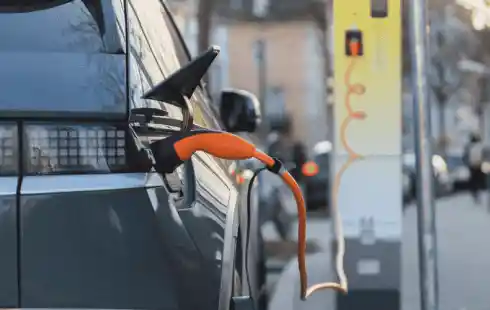Tohru in der Schreiberei, Munich's newest three-Michelin-star restaurant
Section: Arts
 Munich stands at the forefront of Germany's electric vehicle (EV) revolution, boasting around 762,000 registered vehicles, with approximately 25,000 equipped with battery propulsion. Setting its sights on a greener future, the city aims to significantly augment its EV population in the coming years, unveiling plans to nearly double the number of public charging stations by the end of 2026. This strategic initiative was revealed in a draft resolution previewed by the AZ.
Munich stands at the forefront of Germany's electric vehicle (EV) revolution, boasting around 762,000 registered vehicles, with approximately 25,000 equipped with battery propulsion. Setting its sights on a greener future, the city aims to significantly augment its EV population in the coming years, unveiling plans to nearly double the number of public charging stations by the end of 2026. This strategic initiative was revealed in a draft resolution previewed by the AZ.
Presently, Munich hosts 1,200 public charging stations, a number slated to surge with the addition of approximately 1,300 more by the end of the specified period. These stations will offer electric vehicle owners four hours of parking for charging purposes, effectively excluding diesel or petrol-powered vehicles from accessing these spots.
Nikolaus Gradl, a traffic expert representing the SPD city council group, notes the recent surge in EV adoption in Munich, particularly fueled by federal incentives. However, he underscores the pivotal role of adequate charging infrastructure in influencing consumers' EV purchasing decisions. Gradl welcomes the planned expansion, particularly in neighborhoods like Haidhausen and Schwabing, which currently face inadequate charging options due to their concentration of older buildings.
Munich already boasts an impressive 89 public charging points per 100,000 inhabitants, a record-breaking figure nationwide according to the SPD. However, setbacks have occurred, notably a legal misstep that compelled the city to restart the procurement process for 2,700 charging stations, costing precious time and resources. Gradl absolves the administration of blame, attributing the error to legal advisors who failed to meet proper procedural standards.
Efforts are underway to expedite charging station expansion, with the city council slated to deliberate on the matter in the upcoming mobility committee meeting on April 17th. The proposed resolution outlines a zoning strategy, dividing the city into eight sectors for prospective providers to tender. Selection will be determined by lottery. To facilitate this process, the mobility department is advocating for the creation of two new temporary positions.
Initial focus will be on standard charging stations, though Gradl acknowledges concerns regarding their limited four-hour parking allowance for achieving full charge cycles. Discussions are underway to potentially extend this duration. Subsequent resolutions, expected post-summer, will address the installation of fast-charging stations, a more complex endeavor necessitating larger infrastructure and transformer requirements. Munich's municipal utilities have proposed establishing the city's inaugural fast-charging stations at the former Olympic bus station, signaling progress towards a more EV-friendly landscape.
Image by Felix Muller from Pixabay
Section: Arts

Section: Fashion

Section: Politics

Section: Fashion

Section: News

Section: Business

Section: Fashion

Section: Business

Section: Arts

Section: Politics
Both private Health Insurance in Germany and public insurance, is often complicated to navigate, not to mention expensive. As an expat, you are required to navigate this landscape within weeks of arriving, so check our FAQ on PKV. For our guide on resources and access to agents who can give you a competitive quote, try our PKV Cost comparison tool.
Germany is famous for its medical expertise and extensive number of hospitals and clinics. See this comprehensive directory of hospitals and clinics across the country, complete with links to their websites, addresses, contact info, and specializations/services.
Join us at the Kunstraum in der Au for the exhibition titled ,,Ereignis: Erzählung" by Christoph Scheuerecker, focusing on the captivating world of bees. This exhibition invites visitors to explore the intricate relationship between bees and their environment through various artistic expressions,...



No comments yet. Be the first to comment!